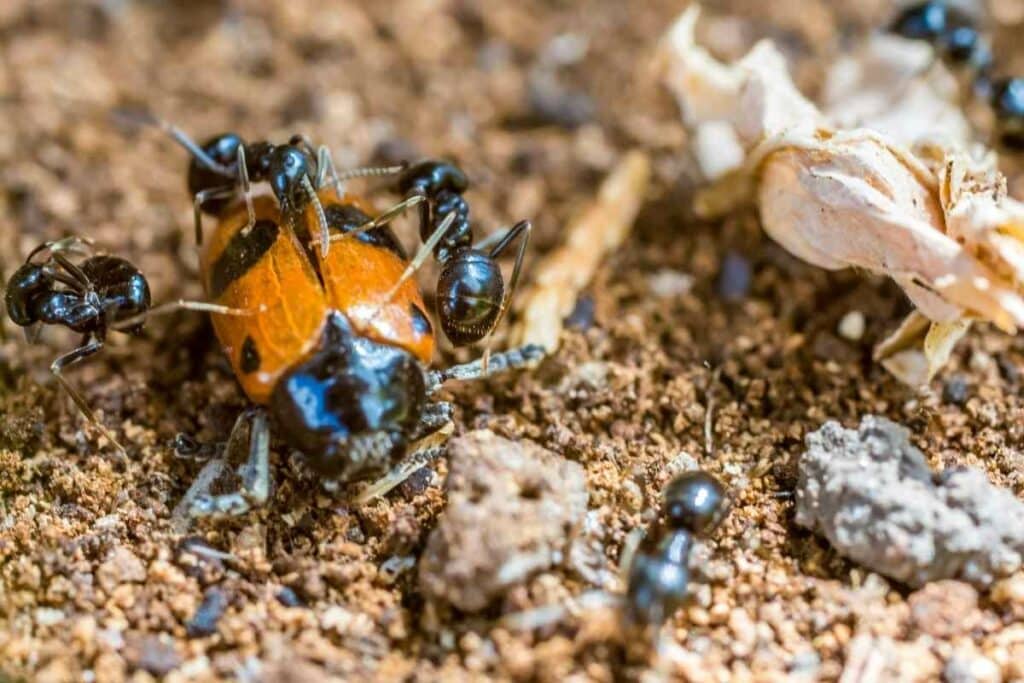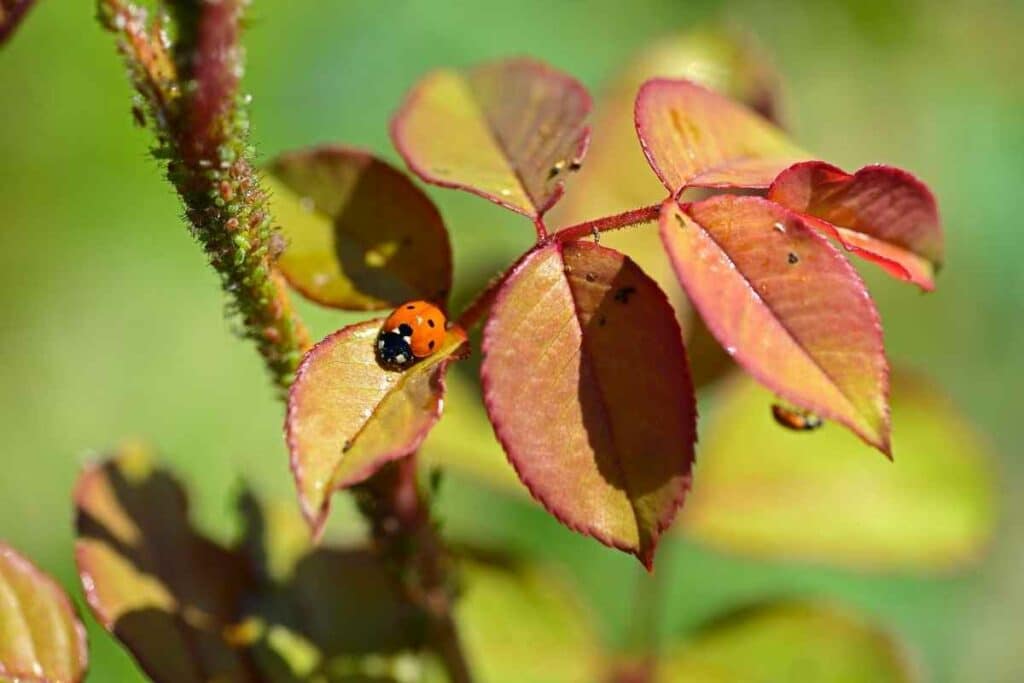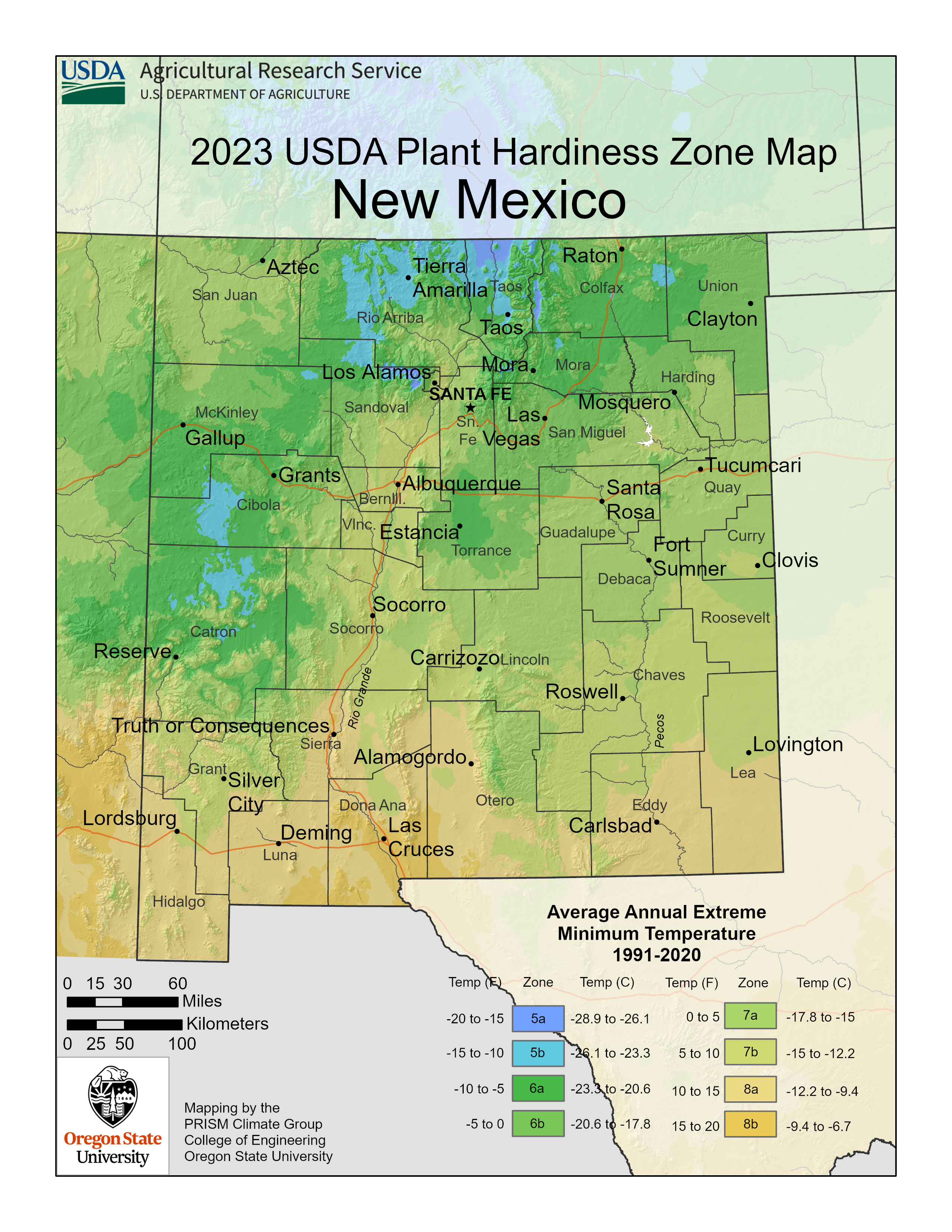Despite their genteel name, ladybugs (Coccinellidae) are surprisingly lethal predators in the average backyard. However, despite their appetite for small insects, these small spotted beetles do not eat ants. Ladybugs and ants are rival kingpins of the garden and are known for their clashes over resident aphid populations that the ladybugs eat and the aphids farm for their honeydew.
In this article, we will explore the ladybird diet and the good work they do against pests in your garden.
We will also take a look at the feud between ladybugs and ants and see which species gets the spoil of aphids and other garden pests.
What Do Ladybirds Eat?
It is hard to miss the conspicuous display of a ladybird on bark or leaves in your garden.

The bright red or yellow spotted carapace or the gentle way in which it crawls along your hand do give the impression that you are dealing with a little lady of a bug.
But ladybirds are ardent carnivores and will even predate smaller members of the Coccinellidae family.
Here are some of the species that are on the ladybug’s menu:
- Aphids, also known as greenflies or blackfly are eaten by both adult and larval ladybirds species. Some Coccinellidae species will target specific types of aphids and go in search of the plants that they feed on. If aphid numbers are abundant in your garden, ladybugs will stick around. These tiny sap-sucking insects are targeted by ladybirds that will even lay their eggs on masses of them as they infest plants. When the eggs hatch, the larval ladybugs will eat the aphids.
- Plant lice (psyllids) are another sap-sucking species that is targeted by the lady beetle. They range in size and can be up to half a centimetre long. Ladybirds can lay thousands of eggs among colonies of these pests.
- Scale insects are soft-bodied insects that suck sap and live attached to plants beneath the waxy cuticle it makes for itself. Ladybirds will ensure that their eggs are laid close to scale insect colonies so that their larvae have instant access to food.
- Mealybugs these soft-bodied pest insects are devoured by ladybugs who are also known as mealybug destroyers!
- Mites (including spider mites) are not a favourite of the ladybirds, but ladybirds will eat spider mites in the absence of preferred food sources.
- The European Corn Borer is an agricultural pest that counts certain ladybird species as natural enemies. The eggs of the corn borer are a particular target for ladybirds who are capable of eliminating up to 20% of corn borer eggs.
- Adelgids feed on conifer plant sap and are very similar to scale insects. Ladybirds can access the higher branches of conifers to predate infestations of this bug.
- Ladybug eggs are also provided as a food source if there is little suitable food available. The ladybird will lay sterile eggs amongst the fertile ones to provide nutrition for its larvae when they hatch.
There is also evidence that at least some ladybird species are omnivorous or even herbivores with certain species even becoming plant pests.
Alternatives: When food is scarce, ladybirds have been demonstrated to eat pollen, nectar, honeydew and certain species of fungi.
How Do Ladybugs Eat?
Ladybirds have highly adapted mouthparts that they use to detect, kill and consume their prey.
Ladybugs have mouths that consist of lips (upper labrum and lower labium), serrated, pinching jaws capable of chewing and grasping.
In addition, they use maxillary palps to sense and taste their food.
Ladybug Aphid Cravings Can Lead to a Head-on Collision with Resident Ants in Your Garden
Aphids and other sap-sucking insects are not only a feast for ladybirds but also a bounty for ants as they rely on mealybugs, aphids and scale insects for a steady supply of honeydew.

This is an exceptionally sweet excreta that is forced out of mealybugs and other plant pests as they feed on plant sap that is under pressure.
For the ants, this is a treasured food source and ants will make a significant investment of their energies in assuring that the golden liquid continues to flow.
The honeydew is force-fed by worker ants to replete ants that simply exist to store the sugary solution in their engorged abdomens!
Any ladybird expecting to feast on scale insects and other honeydew producers may find themselves having to contend with a defensive line of ants that guard and care for the aphids, even transferring them from disease plants to healthy ones when they have overwhelmed them with feeding.
Did You Know? Ants will readily attack and even kill ladybirds that try to disturb their “farm”. Though ladybirds can hold their own, ants have a nasty bite that can inject formic acid into the ladybug, killing it.
The Efficiency of the Ladybird as a Predator of Aphids and Other Pests Make It a Reliable Form of Biological Pest Control
If you are looking for a solution to infestations of sap-sucking insects causing plant diseases like powdery mildew, ladybugs provide an effective means of control.
You can even buy ladybirds in garden centers that have been specifically bred for pest control. Known as the convergent lady beetle, it is distinguished by the converging white lines on its thorax.
When released into a pest-rich environment, these ladybugs will get to work on controlling aphid populations that are present.
However, their effectiveness will depend on the number of ladybirds that are released and the quality of the beetles used. In addition, any ants that are protecting and spreading the infestation will also need to be controlled.
Rounding Up
Ladybirds are welcome garden guests or even residents, due to the good work they do in eating aphids and other sap-sucking insects that can ruin your plants.
If the supply of aphids is available they will stay and breed on them, only leaving when their numbers dwindle.
Ants are definitely not on the ladybug menu and can be a real hindrance if you want to experience the beneficial effects of ladybugs in controlling the pests in your garden.


